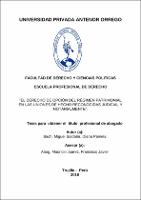Mostrar el registro sencillo del ítem
El derecho de opción del régimen patrimonial en las uniones de hecho reconocidas judicial y notarialmente
| dc.contributor.advisor | Mauricio Juárez, Francisco Javier | |
| dc.contributor.author | Miguel Saldaña, Diana Pamela | |
| dc.creator | Miguel Saldaña, Diana Pamela | |
| dc.date.accessioned | 2018-06-14T23:33:40Z | |
| dc.date.available | 2018-06-14T23:33:40Z | |
| dc.date.issued | 2018 | |
| dc.identifier.uri | https://hdl.handle.net/20.500.12759/4142 | |
| dc.description.abstract | Hablar de la formación de una familia, se nos viene a la mente la institución del matrimonio, sin embargo, actualmente existe en nuestra sociedad más convivencias que matrimonios, por lo que ha sido necesario salvaguardar los derechos de este tipo de familia, pues es una obligación del Estado peruano aprobar una legislación protectora de la familia no matrimonial. Esto significa que el reconocimiento de la unión de hecho como familia requiere de una ley de desarrollo constitucional que regule los efectos personales y patrimoniales de la convivencia. En la presente investigación jurídica se hablará de la regulación actual del régimen de patrimonios de las uniones de hecho reconocidas, con ello, se tocará el tema de la familia y la forma en la que se constituyen actualmente, centrándonos en las uniones de hecho y los derechos otorgados en estas en equiparación a los derechos otorgados al matrimonio. En ese sentido, veremos que en el régimen de patrimonios del matrimonio se protege el derecho de elección que tienen los futuros cónyuges, pues al contraer matrimonio los cónyuges tienen el derecho de opción de elegir entre el régimen de sociedad de gananciales y el régimen de separación de patrimonios, sin embargo, para las uniones de hecho reconocidas se les restringe este derecho al solo imponérseles un régimen único que es el de la sociedad de gananciales, aun cuando voluntariamente concurran al juez o al notario a fin de reconocer su convivencia. Estando a ese panorama, se vislumbra claramente una vulneración del derecho de elección y de autonomía de la voluntad de los convivientes, toda vez que se les viene impidiendo la elección del régimen patrimonial al que deseen acogerse como familia, teniendo en cuenta que la normatividad peruana, regula dos regímenes patrimoniales para el matrimonio, siendo así, es imperante y necesario regular la opción del régimen patrimonial para las uniones de hecho que le permita a los convivientes a elegir su régimen patrimonial y con ello salvaguardar los derechos del tipo de familia de las uniones de hecho. | es_PE |
| dc.description.abstract | Talking the formation of a family, the institution of marriage comes to mind, however, today there is more coexistence in our society than marriage, so it has been necessary to safeguard the rights of this type of family, as it is a obligation of the Peruvian State to approve protective legislation for the non-marital family. This means that the recognition of the de facto union as a family requires a law of constitutional development that regulates the personal and patrimonial effects of coexistence. In the present investigation we will talk about the current regulation of the patrimony regime of recognized de facto unions, with this, the theme of the family and the way in which they are currently constituted will be discussed, focusing on the de facto unions and the rights granted in these in equating to the rights granted to the marriage. In this sense, we will see that in the matrimonial property regime the right of choice of the future spouses is protected, because upon marriage, the spouses have the right to choose between the community property regime and the separation regime. of assets, however, for recognized de facto unions are restricted this right to be imposed only a single regime that is that of the community of acquisitions, even if they voluntarily attend the judge or the notary in order to recognize their coexistence. Being in this scenario, a violation of the right to choose and autonomy of the will of the cohabitants is clearly visible, since they are being prevented from choosing the patrimonial regime they wish to accept as a family, taking into account that the Peruvian regulations , regulates two patrimonial regimes for marriage, thus, it is imperative and necessary to regulate the option of the patrimonial regime for de facto unions that allows the cohabitants to choose their patrimonial regime and thereby safeguard the rights of the family type of the fact unions. | en_US |
| dc.description.uri | Tesis | es_PE |
| dc.format | application/pdf | es_PE |
| dc.language.iso | spa | es_PE |
| dc.publisher | Universidad Privada Antenor Orrego - UPAO | es_PE |
| dc.relation.ispartofseries | T_DERE_406 | |
| dc.rights | info:eu-repo/semantics/openAccess | es_PE |
| dc.source | Universidad Privada Antenor Orrego | es_PE |
| dc.source | Repositorio Institucional - UPAO | es_PE |
| dc.subject | Régimen patrimonial | es_PE |
| dc.subject | Uniones de hecho | es_PE |
| dc.subject | Derecho de opción | es_PE |
| dc.title | El derecho de opción del régimen patrimonial en las uniones de hecho reconocidas judicial y notarialmente | es_PE |
| dc.type | info:eu-repo/semantics/bachelorThesis | es_PE |
| thesis.degree.level | Título Profesional | es_PE |
| thesis.degree.grantor | Universidad Privada Antenor Orrego. Facultad de Derecho y Ciencias Políticas | es_PE |
| thesis.degree.name | Abogado | es_PE |
| thesis.degree.discipline | Derecho | es_PE |
Ficheros en el ítem
Este ítem aparece en la(s) siguiente(s) colección(es)
-
Derecho [424]

